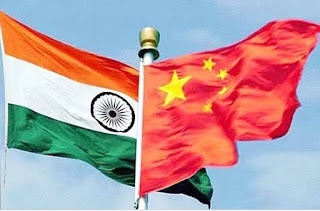1962 : Indo-China War(1/4)
1962 Indo-China War(1/4)
The defeat of India's Credulousness
_________________________________________________
India & China are the most popular and fastest growing economies of Asia.
The Socio-economic relations between these nations date back right from ancient times. The Silk Route not only served for trade but also facilated spread of Buddhism.
The Indo-China contemporary relations had been characterized by the border disputes resulting in military conflicts right from 1962 war to recent Doklam clash.
From my point of view....the 1962 war was an unproductive clash resulting from Chinese imperial policies as the main causes of the war are still unsolved.... Arunachal Pradesh is no doubt an integral part of India,while China continues its activities in Aksai Chin.
The question arises....why did this war took place??? Was it unavoidable???
1. The Rise of INDIA & CHINA
- In year 1947 India sought independence from the clutches of British. Pt.Nehru -a great communist statesman & a good diplomat became the PM of India.
- On 1st October 1949,the Communist Revolution under the leadership of Chou-en-Lai & Mao-tse-Tung became successful. A communist- Public Republic of China (PRC) became the legitimate government of Chin.
- As communism was the biggest point of equivalence between these nations, Nehru always tried developing good relations with Chin.
- But China always minded imperialism superior than peace.
2. Chinese Imperialism & Indian Policies
- Indian politics of having peaceful relations with Chin were firstly shattered in year 1950,when China captured Tibet & declared it as a state of China.
- Till year 1950,India shared it's border with Chin only at J&K,but now the borders were increased to NEFA (Arunachal Pradesh).
- Sardar Vallabhbhai Patel along with other Cabinet Minister adviced Nehru to take a strict step against Chin.
- Nehru had a glorious identity amongst all the Cabinet Minister,so it was unanimously agreed that,"Nehru knows all".
- Nehru said that war with Chin is not beneficial for India,India should seek it's security by maintaining friendly relations with Chin.
3. The MacMohan Line
- The border between India & Chin @ Arunachal Pradesh was called as MacMohan Line. This line was unanimously accepted by British India,Tibet & Chin in 1914.
- From the event of 1950,it was clear that China doesn't accept the border.
- While speaking at the Parliament,Nehru said,"Whether there be any map or not,India will always respect the MacMohan Line."
4. Panikkar's Misunderstanding
- K.M.Panikkar the Indian Ambassador in China,was ordered to have a meeting with Chinese PM- Chow-en-Lai due to rising misconceptions.
- After many meetings, Panikkar concluded that China is silent about India's stand on the border,it means they respect our decision. India-China border is clear and need no further discussion.
5. Hindi - Chini....... Bhai - Bhai
- To strengthen the relationship between India and China,India came up with agreement of 5 Principles of Peaceful coexistence (Panchashil)on 29/4/1954.
- When Chinese President came India,the street were filled with the people with slogans-. Hindi-Chini....Bhai-Bhai.
- But this agreement had no talk regarding the border issues.
6. The real face of China
- According to the Chinese magazine - People Daily,in year 1957 China built a road linking, Sinkiang and Tibet via Aksai Chin.
- Any construction in the disputed territory like Aksai Chin is objectionable.
- In the same year there had been a revolution against China in Tibet,Dalai Lama seeked refugee in India,due to this China became furious against India.
- But to maintain proper relation with China,India remain neutral.
Conclusion:
To seek peace,India always tried to maintain strong relation with China,but China didn't minded India's ideology. Imperialism was the only foreign policy of China
Reference:
https://en.m.wikipedia.org/wiki/Sino-Indian_War
.............To be continued






Khup chan
ReplyDelete